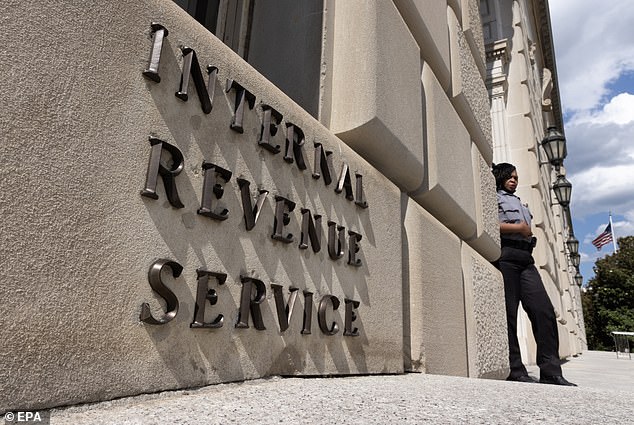IRS moves to end another major tax loophole and raise $50 billion in the process as they zero in on one group of Americans – here is who they are targeting
The IRS has set its sights on what it says is $50 billion in missed tax revenue lost by wealthy people shifting their assets between companies.
The U.S. Treasury Department on Monday announced new rules to tackle “partnership base shifts,” as it warned they would leave behind $160 billion in owed revenues that it says are not paid annually by the top 1 percent of earners.
Biden administration officials said after reviewing the practice that there are no economic rationale for these transactions, with Deputy Treasury Secretary Wally Adeyemo calling it “really just a shell game.”
And they credited the additional IRS funding provided through the Inflation Reduction Act of 2022 for allowing for greater oversight and greater awareness of the practice.
“These tax shelters allow wealthy taxpayers to avoid paying what they owe,” said IRS Commissioner Danny Werfel.
US Deputy Treasury Secretary Wally Adeyemo said the loophole is costing the US billions

The IRS says the top 1% of earners avoid $160 billion in taxes each year
Taxpayers exploit this loophole by moving assets between a series of related parties.
Due to previous years of underfunding, the IRS had cut back on wealthy individuals’ checks and shifting assets between partnerships and corporations became common.
The IRS says filings for large pass-through companies used in the guidelines for the type of tax avoidance increased 70 percent, from 174,100 in 2010 to 297,400 in 2019.
However, audit rates for these companies fell from 3.8 percent to 0.1 percent over the same period.
Miles Johnson, a senior attorney advisor and partnership tax specialist at NYU Law’s Tax Law Center, said, “These transactions effectively flush revenue out of the tax system by creating depreciation deductions or other tax reductions that do not reflect real economic costs.”
He said the proposed rule and guidance show that the IRS wants to stop these types of transactions “by eliminating their tax benefits and better identifying them to the IRS as having no substance.”
Monday’s announcement is part of the IRS’s ongoing efforts to crack down on high-net-worth tax evaders who manipulate the tax code or don’t pay their taxes at all.
Initiatives announced over the past year include going after people and companies that improperly deduct personal flights on corporate jets and collecting back taxes from delinquent millionaires.
The IRS plans to increase audit rates for companies with assets over $250 million to 22.6 percent in 2026, from a rate of 8.8% in the 2019 tax year.
It also plans to increase audit rates tenfold for large, complex partnerships with assets exceeding $10 million.
